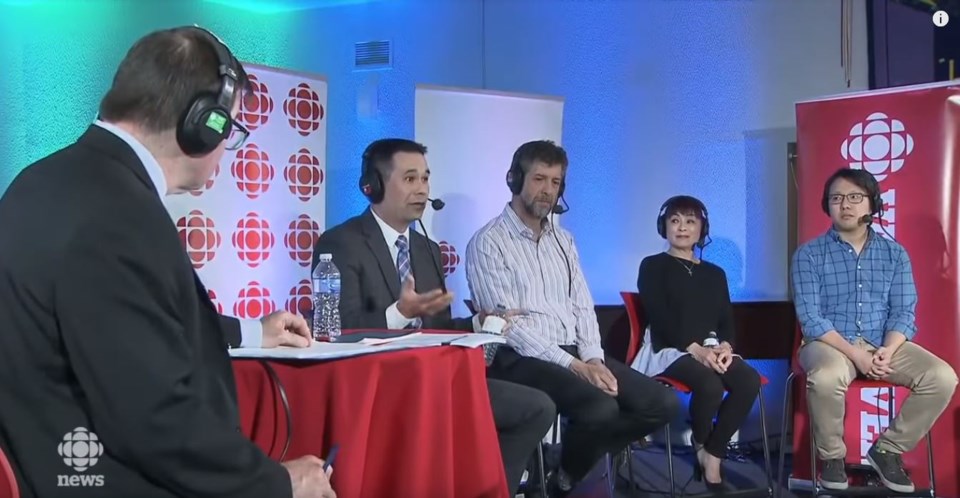Is housing more of a commodity and investment or is it more of a human right? How does Metro Vancouver dig itself out of this housing crisis? Should foreign investment be banned in the residential real estate sector? How do we bond as one community under such divisiveness?
These questions were central at a CBC TV and Fairchild Radio forum at Brighouse United Church Wednesday.
Panelists included developers, real estate experts, academics and one activist.
Long-time Richmond resident and realtor Patsy Hui said “housing is an investment first” but also a human right. Most tended to agree with Hui, who predicted Vancouver’s bubble is subsiding.
Activist Justin Fung, a software developer by day and member of Housing Action for Local Taxpayers (HALT), argued Vancouver’s commodification of housing has tipped the balance unfavourably toward the investment side.
“I think housing can be both but I think we need to shift it further back to being a human right,” said Fung.
Josh Gordon, an assistant professor of public policy at Simon Fraser University, summarized the situation as a “recipe for an unhappy society, and a recipe for breaking down of community bonds.”
This was preceded by much discussion on what can be done to bring housing costs more in line with local needs.
Gordon said the main problem is that the housing market has decoupled from the labour force (incomes).
“It’s decoupled because we make it a fantastic situation for people to bring overseas wealth here and enjoy all the amenities and social services that Canadian society provides and pay the low, low cost of property taxes.”
But developer Jon Stovell, president of Reliance Properties, said the problem largely exists because not enough housing is being built.
His views were similar to associate professor Tsur Somerville of UBC’s Sauder School of Business.
“There’s clearly an inflow of capital, but there’s also an inflow of people… Those demand pieces in a supply-constrained environment… means the market responses are not there as they would be in other places,” said Tsomerville.
Fung, who has previously been critical of developers literally “crafting narratives” around supply, which he notes benefits their bottom line, said lots of housing is already being built but that a lot is one-bedroom “luxury” units are being marketed and sold offshore.
After being asked by a Richmond resident about green space for children, associate professor Tom Davidoff of UBC’s Sauder School of Business said there needs to be more rezoning of single-family home neighbourhoods, where such space exists.
He concluded his argument by acknowledging concerns that redeveloping neighbourhoods should not happen if new housing is being marketed offshore. And that’s why he supports the foreign homebuyers’ tax, speculation tax, and Vancouver’s empty homes tax.
“That’s where I think tax policy and zoning policy go hand in hand,” said Davidoff.
CBC personal finance columnist Mark Ting, also a Richmond resident, said tax policy has yet to cool the low end of the market — condos.
The discussion took place in Richmond, which has the highest rate of foreign ownership of new condos — about 24 per cent.
Richmond resident, philanthropist and civic policy analyst Tung Chan said rezoning land for density is paramount. The former Vancouver city councillor said people didn’t think Yaletown would be family oriented but that notion was proven wrong.
Richmond Chamber of Commerce CEO Matt Pitcairn spoke briefly from the audience, stating the right kind of housing supply for families is needed in Richmond for its workforce.
Kira Gurwing, manager of community investment at Vancity Credit Union, said it is important not to get stuck in the “dominant economic paradigms.”
She said co-operative, community initiatives by non-profit groups — such as how Brighouse church is proposing to build 180 rental housing on its site — are needed.
One resident asked about pre-sale condo flipping.
Stovell said presales are an important and required financing tool for developers.
He said the fact realtors are bringing insiders to buy these condos first is a reality of the market.
“On a project that we sold, a realtor brought 100 buyers. And those are buyers who have a track record of not rescinding on their contract,” said Stovell.
Gordon said the frustration over speculation has come to a boiling point.
“It’s frustration on the part of locals who feel the game is rigged,” said Gordon, explaining that 90 per cent support for the foreign tax is unprecedented for any sort of public policy.
Somerville has previously gone on record stating concerns over money from China is racist.
But Gordon noted support for the tax crosses all classes and ethnicities.
At one point, community activist Kerry Starchuk asked the panel if a ban on foreign investment in real estate should be considered.
“The public is on board with what you’re saying,” noted Gordon, pointing again to public polling.
“Don’t do it,” said Stovell.
Gordon fielded a question from an ethnic Chinese resident who blamed media for biased reporting.
Gordon said the housing mess has happened in part because people were afraid to talk about foreign money and that any vilification must be immediately called out because “what we’re talking about is fixing a broken policy framework.”



